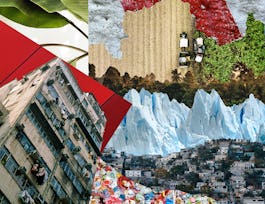Latin American cities are still growing in an uncontrolled way, due to informal place occupation and the absence of urban planning policies, generating the construction of informal human settlements. In this vulnerable urban context, many children are born and raised without having access to safe, inclusive and stimulating public spaces.



Empfohlene Erfahrung
Was Sie lernen werden
Identify your intrinsic motivators and determine a focus area to start your social change journey
Explore and apply design thinking as a tool to enact social change in your community
Deliver a tangible, actionable plan to make a difference in yourself, your community and to the greater movement for social change
Expand your social change network, and reflect on and assess strengths and weaknesses in your skillset to enhance your social change journey
Kompetenzen, die Sie erwerben
- Kategorie: Critical Spatial Practice
- Kategorie: Design for Care
- Kategorie: Inclusive Urban Development
- Kategorie: Child-friendly Design
- Kategorie: Public Space Design
Wichtige Details

Zu Ihrem LinkedIn-Profil hinzufügen
Juni 2024
16 Aufgaben
Erfahren Sie, wie Mitarbeiter führender Unternehmen gefragte Kompetenzen erwerben.


Erwerben Sie ein Karrierezertifikat.
Fügen Sie diese Qualifikation zur Ihrem LinkedIn-Profil oder Ihrem Lebenslauf hinzu.
Teilen Sie es in den sozialen Medien und in Ihrer Leistungsbeurteilung.

In diesem Kurs gibt es 7 Module
Welcome to the first Module of the MOOC “Urban Landscapes of Care - Thinking and designing child-friendly cities”! In this first week, we will give you a short introduction to the course and its challenge involved: to improve our cities for small children and their caregivers through the design and development of an Urban Landscape of Care. To begin, we will learn about experiential urban analysis methods and how to apply them during an exploratory walk through the city. With that tool, we can gain a more empathetic and inclusive perspective towards the urban environment in which we live and work. The first practical exercise will be the start of the project we will develop throughout the course. We will also discuss the diversity of our cities, the different actors and social groups inhabiting the territory, their needs, dreams, and finally their relationship with the built environment.
Das ist alles enthalten
9 Videos8 Lektüren2 Aufgaben3 Diskussionsthemen4 Plug-ins
Welcome to the second week of our MOOC! The second module will be divided into three main topics; the composed city, the public city, and the city that cares which will be summarized in a final reflection that interpellates the questions on: What is it that composes our cities? What does public space mean? What defines a good public space? What is the difference between public space, urban environment, and an urban landscape? What is an"Urban Landscape of Care"? and, Who requires an urban landscape of care and why? All those questions we will tackle in this second Module of the MOOC "Urban Landscapes of Care".
Das ist alles enthalten
5 Videos4 Lektüren3 Aufgaben4 Diskussionsthemen2 Plug-ins
In this third week of the course, we will learn about early childhood development and its relation with the urban space based on the experience of young children. Also, we will show the importance that early years have for brain development and cognitive abilities. Based on these concepts we will understand the city as a learning platform that has to answer to their expectations and needs.
Das ist alles enthalten
5 Videos3 Lektüren5 Aufgaben2 Diskussionsthemen1 Plug-in
In the fourth week of this course, we will learn about the characteristics, elements and design strategies for an Urban Landscape of Care for small children and their caregivers. This will include design principles, stakeholders identification, and how the interaction between the small child and an Urban Landscape of Care can contribute to child development. s the Internet has had on the world.
Das ist alles enthalten
7 Videos3 Lektüren2 Aufgaben1 peer review2 Diskussionsthemen1 Plug-in
In the fifth week of the course, we will learn about the design tools we can apply in the development of an Urban Landscape of Care. Apart we will reflect and learn about the role and stages of community engagement work that can accompany the design process. As well, you will explore different participatory tools that can help you to engage with your community. Finally, we will discuss the strategies and possibilities to make our projects sustainable in time.
Das ist alles enthalten
5 Videos7 Lektüren3 Aufgaben4 Diskussionsthemen4 Plug-ins
Welcome to the sixth week of the MOOC "Urban Landscapes of Care - Thinking and designing child-friendly cities". In this module, we will learn about the importance of communicating our projects – graphically and through an inspiring presentation. Therefore we will explore a series of tools to represent graphically and communicate the design of our Urban Landscape of Care. Apart from that, we will talk about the steps that follow the design phase of our project, such as the management of time, stakeholders and the available resources.In the process, we will raise the following questions: How do we communicate with all the stakeholders involved? How do we organize the implementation phase of our project? What resources do we have available and what others do we need to realize the project? Finally, this module gives us the opportunity to reflect on the phenomenon of "between control and uncertainty" and how we as planners can respond to these particular moments within a project. As a result of this week we will elaborate the implementation roadmap for the Urban Landscape of Care we are developing in this course. Enjoy!
Das ist alles enthalten
6 Videos3 Lektüren1 peer review6 Diskussionsthemen1 Plug-in
Welcome to our last module of the MOOC “Urban Landscapes of Care - Thinking and designing child-friendly cities”! In this last module of the course we will learn about how to close the cycle of a project - in Module 5 we called it the “transformation cycle”. In that sense we will talk about impact measuring tools and the possible steps of rethinking, re-planning, replicating or up-scaling our projects. Further we will evaluate our learning process within the whole course. We will travel in time and review the milestones of the MOOC. And finally we will come to our very last reflection of the course: If we are able to develop urban landscapes of care for young children and their caregivers at a small neighborhood scale, is it possible that also our cities become urban landscapes of care? What would they look like? Could this vision give us a perspective on how to plan and build our future cities and neighborhoods as safe, inclusive and stimulating spaces not only for young children, but for everybody?Join the discussion. We hope you enjoy the last module of the course!
Das ist alles enthalten
3 Videos3 Lektüren1 Aufgabe2 Plug-ins
Dozenten



Empfohlen, wenn Sie sich für Education interessieren

Johns Hopkins University

École Polytechnique Fédérale de Lausanne

Erasmus University Rotterdam
Warum entscheiden sich Menschen für Coursera für ihre Karriere?





Neue Karrieremöglichkeiten mit Coursera Plus
Unbegrenzter Zugang zu über 7.000 erstklassigen Kursen, praktischen Projekten und Zertifikatsprogrammen, die Sie auf den Beruf vorbereiten – alles in Ihrem Abonnement enthalten
Bringen Sie Ihre Karriere mit einem Online-Abschluss voran.
Erwerben Sie einen Abschluss von erstklassigen Universitäten – 100 % online
Schließen Sie sich mehr als 3.400 Unternehmen in aller Welt an, die sich für Coursera for Business entschieden haben.
Schulen Sie Ihre Mitarbeiter*innen, um sich in der digitalen Wirtschaft zu behaupten.
Häufig gestellte Fragen
Access to lectures and assignments depends on your type of enrollment. If you take a course in audit mode, you will be able to see most course materials for free. To access graded assignments and to earn a Certificate, you will need to purchase the Certificate experience, during or after your audit. If you don't see the audit option:
The course may not offer an audit option. You can try a Free Trial instead, or apply for Financial Aid.
The course may offer 'Full Course, No Certificate' instead. This option lets you see all course materials, submit required assessments, and get a final grade. This also means that you will not be able to purchase a Certificate experience.
When you purchase a Certificate you get access to all course materials, including graded assignments. Upon completing the course, your electronic Certificate will be added to your Accomplishments page - from there, you can print your Certificate or add it to your LinkedIn profile. If you only want to read and view the course content, you can audit the course for free.
You will be eligible for a full refund until two weeks after your payment date, or (for courses that have just launched) until two weeks after the first session of the course begins, whichever is later. You cannot receive a refund once you’ve earned a Course Certificate, even if you complete the course within the two-week refund period. See our full refund policy.


